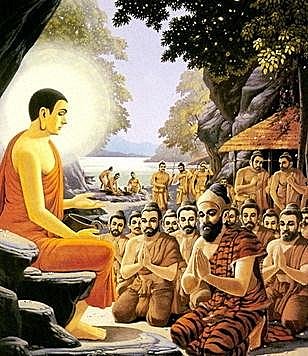
護僧的基本認知(七)
開仁法師著
六丶僧俗倫理觀
目前有的在家居士會產生佛法不入心的問題,也是因為對於僧俗倫理的認知不足,就好像:出家人太過年輕,以世俗的眼光來看的話,可以作為我的孩子了,為什麽我要聽他說法呢?未出家前我們是好朋友,剃光了頭依然是我的好朋友,他有什麽德行讓我心服口服的呢?我的知識都還比法師高深,他有多少料子教導我呢?有錢即能使鬼推磨,出家人還不是靠我的佈施才能活下去嗎?我們是知識份子,沒有念過佛學院,擁有高深理論的出家眾,一律不歡迎你來?尊敬供養禮拜出家眾,不是因為他有德,而是我有修養?以上種種不幸的事情發生,除非出家人本身不懂得自尊自重,這不談也罷。否則,大多數原因來自於白衣不清楚僧俗的倫理觀念,以為眾生平等就是大家一樣,這在經論中可以找到線索。
佛教的倫理觀很重要,因為這是維護一個團體的道德觀念,一旦這條界線破裂了,群體一定亂無秩序,甚至連最基本的恭敬尊重亦會喪失掉。話說回來,僧俗之間若沒有了為法而來的理念的話,可能會產生:一丶彼此相處在一起,只是增添世俗的染汙而已;二丶在家者對出家人的禮敬,純粹僅存於形式化,甚至於會導致對三寶不能有皈依的嚮往了(有也只是二寶了,僧寶不算在內)。
僧俗之間一定要建立良好的倫理關係,好處如:一丶出家人的地位在其心目中還是聖潔的;二丶出家人的教誨,依舊可以奉行無疑;三丶面對出家人時,自然憶想起佛陀清淨的僧團,不自覺地欲頂禮膜拜;四丶相信出家人所代表的是僧團,禮敬供養即等同護持三寶,有三寶的住世,佛的法才能綿綿不絕地流傳下去。
在這裏要堅持僧俗倫理觀,另一目的是為了保護僧眾的身份,受了大戒的僧人,小小的微細戒,隨時都會觸犯,除了出家眾本身要加倍謹慎外,身為白衣的也要多用心一點,就算是沒有過出家的經驗,不知道戒律的內容,這也不是問題,但至少能夠想到說,出家人有很多行為是不能做的。若是彼此完全沒分別的話,為什麽其可以不必勞作而可以獲得恭敬供養呢?
The Fundamental Knowledge in Safeguarding the Sangha Members(七)
By Ven Kai Ren
6. The Logical Concept of Sangha Members and Lay Buddhists
At present, some of the lay Buddhists are not so committed because they do not have a good understanding on the moral principles of the Sangha. For example; some senior lay Buddhists feel that the Bhikkhus are too young and there is no point to learn from them and eventually look down on them. Another example, a Bhikkhu before becoming a Bhikkhu is my friend and after becoming a Bhiksu is still my friend, how is he going to convince and enlighten me on the Buddhist teaching when I know more than him. As the wise saying goes: Money makes the mare to go and these monks can only survive with my charity. We are intellectuals, monks who do not have high Buddhist knowledge and who have not passed out from Buddhist Institution are not welcome? Revering and making offering to Sangha members is to show that we are educated and not because of the virtue of the Sangha members. The above unfortunate cases showed that majority of the lay Buddhists did not have a good understanding of the moral principles of the Sangha unless the Sangha themselves are not disciplined. Lay Buddhists take for granted all sentient beings are equal and so for the Sangha members.
The moral principles are very vital in Buddhism. Without them, there will be disorder and chaos in a community. Even the very basic respect and honor will be drained. However, if there is no concept base on Dharma between the Sangha members and lay Buddhists, it may give rise to the following: 1. It will pollute the mundane world when both Sangha members and Lay Buddhists are staying together; 2. It’s only a formality of respect to the Sangha members by the lay Buddhists.
A very good moral principle should be established between the Sangha members and the lay Buddhists. The benefits are: 1. The position of Sangha, in the eyes of lay Buddhists, is still esteemed; 2. The teachings of the Sangha will not be questioned; 3. When facing the Sangha, one will still recall the purity of the Sangha during the Buddha’s time and eventually show respect and bow to them; 4. It will be made to believe that Bikkhus represent the Sangha. Showing respect and making offering to them are equivalent to protecting the Triple Gems.
The moral principles between the Sangha members and lay Buddhists ought to be upheld on the ground to protect the identity of the Sangha. Bhikkhus who observed the full 227 precepts may, anytime, break some of the very minor precepts. The Bhikkhus, besides need to be cautious, the lay Buddhists also need to be alert. Even if the lay Buddhists do not the experience of renouncing the household or do not even know what the Vinaya is, it is not the problem too. At least, the lay Buddhists know there are many demeanors and conducts the Bhikkhus need to be refrained. Without difference between the Bhikkhus and lay Buddhists, one may ponder why Bhikkhus could obtain all these respects and offerings for nothing?
沒有留言:
張貼留言